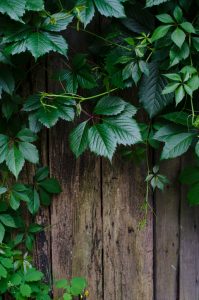
Vines look beautiful and add privacy to your yard, but you must be sure you’re planting the right type of vine.
Vines are an elegant and classic feature for your outdoor living space. Not only are vines beautiful, but when they grow on fences, they add another element of privacy and intimacy to your backyard. Unfortunately, since vines are resourceful plants, they climb up fencing and can hold on tight, weighing your fence down. Ensuring that you’re planting the right type of vine for your existing fencing will protect the integrity of your structure and provide the right aesthetic for your decor.
Vines to Avoid
Certain vines are just not friendly for wood fencing and should be avoided. Typically, fast-growing, woody or invasive species of vines will destroy your fencing, so, if you like those types of vines, they should stay far away from your fencing. Species like wisteria or trumpet vines can attract hummingbirds and butterflies and are incredibly beautiful, but grow densely and will trap excess moisture against your fence. The extra moisture fosters fungus, bugs, and rot which will destroy a wooden fence. Invasive species, like the American bittersweet vine, chocolate vine, English ivy, and Japanese honeysuckle can choke out other plants in your garden. Unfortunately, if it’s overgrown, the only way to rid your backyard of an invasive is with chemical herbicide which may damage the other plants in your garden.
Fence-Friendly Vines
Depending on the type of fence you have in your yard, there are some vines that do great on fencing. The most delicate kind of fencing is wood fencing, but annual vines like morning glory, moonflower, or climbing nasturtium will work well with wood fencing because they are not as dense as woody vines and will allow the wood to dry out under them. While they don’t provide much in the way of additional privacy, they have gorgeous flowers that will attract butterflies. You should also remove the vines after the season, so they don’t rot on your fence in the late fall and winter.
Vinyl and aluminum fencing are more durable and can withstand woody and perennial vines a little better. Woody vines will still cause algae and bug problems, but vinyl is non-porous, so the algae is easy to clean off and won’t stain. Aluminum fences resist virtually everything, like moisture and even rust, so this type of fence would be ideal for a living fence with woody vines like wisteria or grapevines.
Choose Hercules Fence
When it comes time to decide what color is right for your new fence, trust the experts at Hercules Fence. For more information and to learn how we can meet your custom fencing needs, contact Hercules Fence online or give us a call at 800-395-9597. We will ensure your investment serves your family for years to come! For updates and to see projects we’re working on, visit us on Facebook, Twitter, LinkedIn, YouTube, Google+, and Pinterest.













